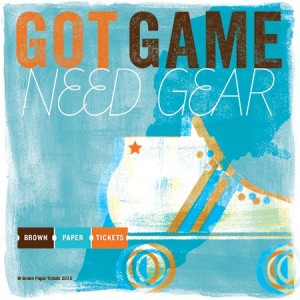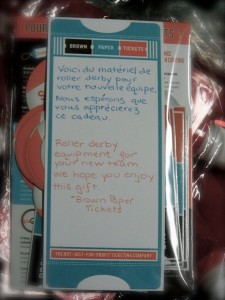
 I’m excited to announce that with Brown Paper Tickets’ help, we’ve been able to collect and send merchandise to a burgeoning roller derby league in Lebanon—Roller Derby Beirut (RDB). And now, we have new tools in place to collect more supplies and raise funds so this league can continue.
I’m excited to announce that with Brown Paper Tickets’ help, we’ve been able to collect and send merchandise to a burgeoning roller derby league in Lebanon—Roller Derby Beirut (RDB). And now, we have new tools in place to collect more supplies and raise funds so this league can continue.
The funds will be used to purchase new gear for RDB. I’m proud to be a part of this initiative. However, none of it would have been possible without Elisabeth Wolffhechel, aka “LOL” of the A-team out of Copenhagen, Denmark.
I first saw the call to help RDB this past November, while working the WFTDA European Tournament in Malmo, Sweden and then I saw it again at the Women’s World Cup. I tracked Wolffhechel down when I realized I could assist with the project.
Sweet Beginnings
Wolffhechel a university student in Copenhagen, paved the way for RDB, through her work with GAME, a Danish organization that wanted to get involved with the Middle East. Using street sports, GAME teaches kids and young adults about democratic ideas, taking responsibility and equal rights for women.
Watch a video of GAME Finals Beirut 2015 event, and the first roller derby match ever in Lebanon.
As a GAME employee, Elisabeth founded RDB within her body of work. The quest also helped her to return with experience for her master’s thesis. She left for Beirut late January of last year and returned to Denmark in July.
Building a League + Changing Minds
Any time derby breaks social mores where girls and women aren’t accepted as equals, it begs asking about the reaction. There are parts of the world that are not as accepting to girls on skates in a physical game.
As anticipated, RDB didn’t always impress parents as a sport suitable for women. Another hurdle she encountered was that different political factions control different parts of Beirut, making it difficult for some to find transportation to practice. Wolffhechel had to navigate varied social values. It wasn’t just about building a league; it was about changing minds.
The moment some of the young ladies returned home physically sore, they were told to quit. Wolffhechel feels the parents’ naivety of the sport presented more of a challenge than the cultural barriers. Women’s sports, in general, are very under-developed. Insurance is also an issue.
RDB, a Catalyst for Global Change
A university that draws students from all over the world sits in the center of Beirut—many skaters are university students. This adds to the importance of RDB, as when these women graduate, they will hopefully spread derby to new areas of the world.
Practice space wasn’t quite the issue I would have predicted. RDB was able to find practice space under a roof, though not an enclosed building, providing fair protection from the weather on a consistent basis. As far as a playing venue, sports facilities require rent, which is currently unrealistic.
Upon Wolffhechel’s leaving, they had 12 skaters committed to the league. She divided duties before she returned to Denmark and currently, the skaters are self-run.
Wolffhechel started something wonderful, but RDB needs a little derby love to keep rolling. Brown Paper Tickets created a donation portal to help keep the league in the game. Donate to the drive. I will buy new gear for the league and Brown Paper Tickets will ship it to Derby Beirut with a love note.
Skates are the hardest to round up—I hope this donation drive will be the answer to getting equipment and skates to league members, who are often exchanging skates even just to practice.
Every little bit helps. Make a donation or spread the word to your pals.
Good Causes >


 Arts
Arts Comedy
Comedy Event Tips
Event Tips Film
Film Food & Drink
Food & Drink Good Causes
Good Causes Music
Music News
News Radio
Radio Roller Derby
Roller Derby